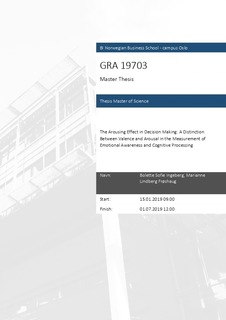The Arousing Effect in Decision Making: A Distinction Between Valence and Arousal in the Measurement of Emotional Awareness and Cognitive Processing
Master thesis
Permanent lenke
http://hdl.handle.net/11250/2626092Utgivelsesdato
2019Metadata
Vis full innførselSamlinger
- Master of Science [1621]
Sammendrag
This thesis examines the effects of emotional awareness on cognitive processing
in a subsequent decision making case. We assert that emotional awareness has
valuable implications for mental health and well being, but also decision speed
and learning. Rather than taking a purely valence-based approach, our findings
suggests that other emotional aspects than subjective valence are indeed important
in the study of emotions and decision making. Our results highlight the
importance of subjective arousal, and emphasize the inclusion of emotional
awareness in future studies in the field of judgment and decision making. Further
results showed that emotional awareness had a strong positive correlation with
intuitive processing, and a negative correlation with analytical processing. As
predicted, subjective arousal was negatively related to analytical processing style
and positively related to intuitive processing style. Both subjective arousal and
valence were further significant in explaining the relationship between emotional
awareness and intuitive processing.
Overall, findings imply that studies may benefit from going beyond
valence when investigating emotion and its effects on cognitive processing. Our
findings further provide an insight into how individuals evaluate emotions as
information in cognitive processing, and thereby decision making behaviour.
Findings, practical implications, future research and limitations will be discussed.
Beskrivelse
Masteroppgave(MSc) in Master of Science in Leadership and Organizational Psychology - Handelshøyskolen BI, 2019
